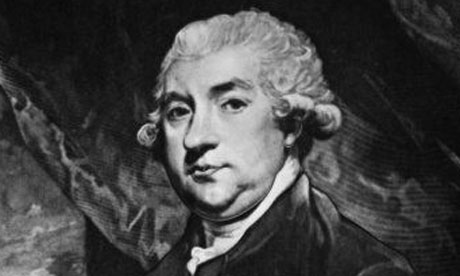
A man famously indelicate in his choice of female companions was one James Boswell, best known as the biographer of Samuel Johnson. Born into a family of lowland Scots gentry in 1740, he was heir to a large estate in Ayrshire. Although Boswell lived in Edinburgh where he worked as a lawyer, he made frequent trips to London, which was where most of his philandering took place. His diary records regular sexual encounters with numerous prostitutes, and the ensuing bouts of painful venereal infections. In fact, he contracted venereal disease from his very first sexual encounter. To give an idea of his sexual activities: between the ages of 20 and 29, he slept with three married gentlewomen, four actresses, managed a fling with Rousseau's mistress, kept three mistresses and had connections with at least 60 streetwalkers. His sexual appetite was uncommonly large and his friends tended to regard his frequent infections as something of a joke.
Boswell used an animal gut condom in his liaisons with prostitutes, but not consistently enough to avoid 19 or more attacks of gonorrhea. He mentions condoms fairly frequently, however, usually referring to them as "machines" or as "armour". For example, one diary entry from Boswell reads:
"Tuesday 10 May 1763
At the bottom of the Haymarket I picked up a strong, jolly young damsel, and taking her under the arm I conducted her to Westminster Bridge, and then in armour complete did I engage her upon this noble edifice. The whim of doing it there with the Thames rolling below us amused me much."
The most popular cure for the pox was mercury. Boswell uses mercury as a metaphor for London – beneficial if taken in small doses. But then his attitude to London was often to go on a bender when he was in town. (Interestingly, most of his raciest diary entries take place in April and May, it is unclear if he happened to be in town then because of the legal annual calendar, or if he just felt the sap rising.) He was treated with mercury in small amounts, but as he never showed syphilitic symptoms, he wasn't treated with it seriously. Either combined with the ointment of mercury or used alone, a cinnabar fumigation was also deemed an effective cure. Cinnabar is a combination of mercury and sulphur, which would be placed on a hot iron under a commode on which the patient would sit. Blankets would be suspended from overhead. If the fumigation was to treat syphilitic ulcers in the ear nose and throat area, then the patient would hold the cinnabar and breathe deeply, often for several hours at a time, twice a day.
For testicular swellings, either a truss or a poultice was recommended. Johnson's friend Mrs Thrale had the doubtful honour of both mixing and applying a poultice to her husband after he had showed her "a Testicle swelled to an immense size". She wrote in her diary:
"My poor father's prophecy was verified who said if you marry that scoundrel he will catch the pox and for your amusement set you to make his pultices. This is now literally made out and I am preparing pultices as he said, and formenting this elegant Ailment every night and morning for an hour together on my knees…"
In 1761, Boswell began a relationship with Anne Lewis, an actress he had known in Edinburgh and who was separated from her husband. His affair with Anne is recounted in some detail in his diaries (he uses the false name of "Louisa") and there is a lively account of over-anxious brothers, landladies bursting into the room at inopportune moments, and also their break-up is recorded in dialogue. Hubristically, as really the relationship was planned to provide a winter of safe sex, soon after their relationship began:
"I this day began to feel an unaccountable alarm of unexpected evil: a little heat in the members of my body sacred to Cupid, very like a symptom of that distemper with which Venus, when cross, takes it into her head to plague her votaries."
Boswell doesn't believe her assertions that she had been without symptoms for months, and the affair ends badly. Boswell records his final letter to Louisa, which is a real blockbuster of a letter, possibly the best "end of the affair" letter of all time.
The current increasing resistance to treatment for gonorrhoea is unlikely to mean a return to 18th-century treatments, although the fear of contagion is something that Boswell would clearly have recognized. A more pleasant way for us today to revisit the 18th century is to visit the London haunts of Boswell – walk down the Strand, through the Temple and along Fleet Street, and pay a visit to Dr Johnson at No 17 Gough Square.
• Follow Comment is free on Twitter @commentisfree

